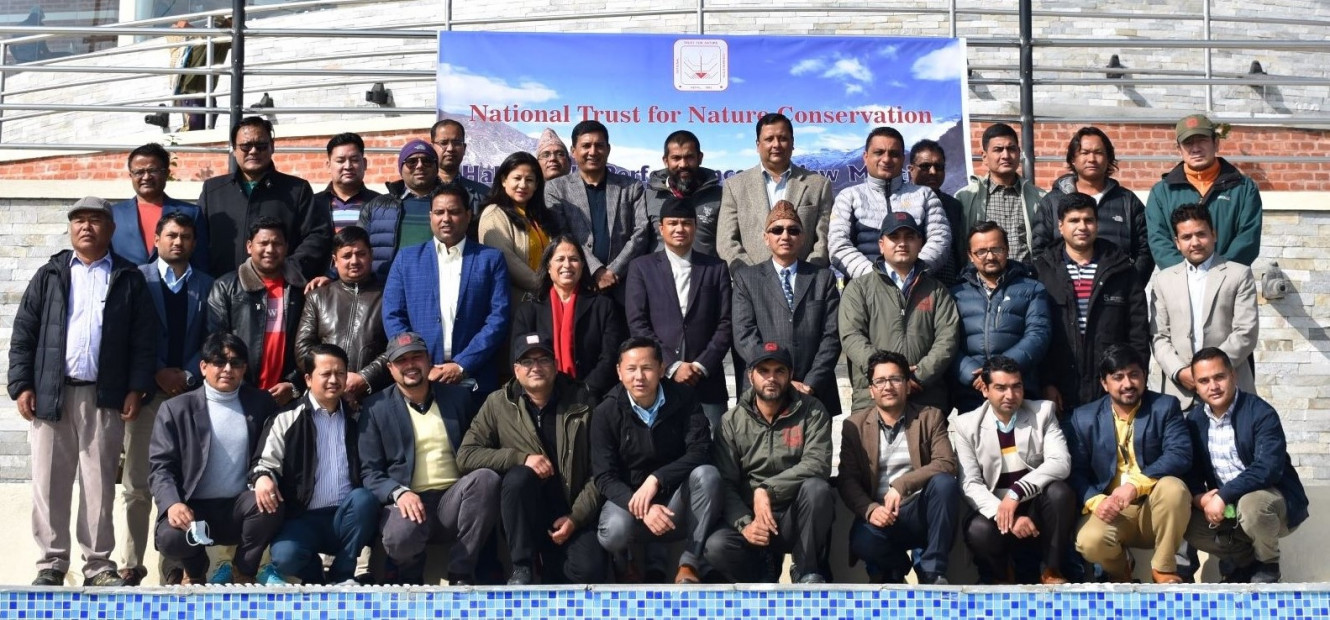
A three-day programme, bringing together more than 40 officers from NTNC's project offices and field-based stations across the country concluded yesterday. Organized in Dhulikhel as a residential event, this is the first time since the Covid-19 outbreak where all project chiefs, managers and officers have been able to meet together in person to discuss critical issues, strategies and prospects moving into the future. Keeping the long pause in mind, the meeting-cum-workshop was themed at reenergizing, cultivating positivity, and enhancing team building.
Dedicated sessions consisting of project-wise half-yearly progress and performance review, along with discussions about project-level strategies in the face of new challenges; the USAID's Hariyo Ban Program review, reflection and learnings from the past ten years, its legacies and lessons for NTNC as one of the potential partners moving into the planned 'Jal Jungle' Project were discussed closely. New funding and proposal development opportunities in the face of NTNC's recent accreditation with the Green Climate Fund (GCF), including discussion on potential GCF project topics and approaches to use for concept note preparation; individual project priorities and ambitions for the next decade, along with potential challenges foreseen; research-based insights and findings being pursued were all shared and deliberated upon extensively.
Apart from project- and programme- focused discussions, special sessions for building managerial capacities about how to cultivate positive thinking and nurture collective competency, integrity and empathy was shared, this in addition to lessons on financial and procurement-related best practices for keeping up with good governance standards.
Among some of the major topics for discussion were related to the Annapurna Conservation Area's future management modality, where NTNC has already proposed a management alternative with the Government of Nepal; growing human-wildlife conflict-related challenges, especially in the Tarai national parks where recent tiger attacks on humans are seen on the rise; community anti-poaching initiatives to combat wildlife crime; risks posed by unplanned and haphazard road and linear infrastructure development; wildlife habitat fragmentation and biological connectivity; wildlife rescue and rehabilitation among others. The severe financial implications of covid together with funding initiatives being taken for sustaining the successful management of NTNC's mountain projects (ACAP, MCAP, GCAP), including the Central Zoo in Kathmandu, was also discussed at length.
Beyond NTNC's existing conservation initiatives, areas of interest to foray into the future included discussing ideas for making targeted investments in water, climate, wildlife genetics, nature-based tourism and heritage conservation. Extending NTNC's expertise in as many provincial and local-level governments, along with proactively engaging with academic institutions and researchers, broadening partnerships with the private sector, both at home and abroad, and securing the goodwill of a vibrant NTNC that is able to demonstrate itself as a centre of excellence in the wildlife sciences was emphasized.
In his remarks, NTNC's Member Secretary, Mr. Sharad Chandra Adhikary who was also the chair of the meeting said, "the covid situation may have hurt NTNC's funding capacity, but it has certainly brought clear lessons for the world to protect nature and conserve biodiversity better, while motivating more people to work together as a part of the solution for protecting nature, not based on sheer speculation, but based on definite science. For any credible nature conservation and research-focused institution, this is great news. So let us be positive and continue to offer what we know and do best despite all."
